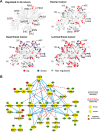Ischemia in tumors induces early and sustained phosphorylation changes in stress kinase pathways but does not affect global protein levels
- PMID: 24719451
- PMCID: PMC4083109
- DOI: 10.1074/mcp.M113.036392
Ischemia in tumors induces early and sustained phosphorylation changes in stress kinase pathways but does not affect global protein levels
Abstract
Protein abundance and phosphorylation convey important information about pathway activity and molecular pathophysiology in diseases including cancer, providing biological insight, informing drug and diagnostic development, and guiding therapeutic intervention. Analyzed tissues are usually collected without tight regulation or documentation of ischemic time. To evaluate the impact of ischemia, we collected human ovarian tumor and breast cancer xenograft tissue without vascular interruption and performed quantitative proteomics and phosphoproteomics after defined ischemic intervals. Although the global expressed proteome and most of the >25,000 quantified phosphosites were unchanged after 60 min, rapid phosphorylation changes were observed in up to 24% of the phosphoproteome, representing activation of critical cancer pathways related to stress response, transcriptional regulation, and cell death. Both pan-tumor and tissue-specific changes were observed. The demonstrated impact of pre-analytical tissue ischemia on tumor biology mandates caution in interpreting stress-pathway activation in such samples and motivates reexamination of collection protocols for phosphoprotein analysis.
© 2014 by The American Society for Biochemistry and Molecular Biology, Inc.
Figures





References
Publication types
MeSH terms
Substances
Grants and funding
- P30 CA016672/CA/NCI NIH HHS/United States
- U24 CA159988/CA/NCI NIH HHS/United States
- P50 CA068438/CA/NCI NIH HHS/United States
- U54CA112970/CA/NCI NIH HHS/United States
- U24CA159988/CA/NCI NIH HHS/United States
- UL1 RR024992/RR/NCRR NIH HHS/United States
- U24CA160036/CA/NCI NIH HHS/United States
- P30 CA091842/CA/NCI NIH HHS/United States
- P50 CA083639/CA/NCI NIH HHS/United States
- U24CA160035/CA/NCI NIH HHS/United States
- P30CA091842/CA/NCI NIH HHS/United States
- U24 CA160034/CA/NCI NIH HHS/United States
- P30 CA014051/CA/NCI NIH HHS/United States
- CA016672/CA/NCI NIH HHS/United States
- P01CA099031/CA/NCI NIH HHS/United States
- U54 CA112970/CA/NCI NIH HHS/United States
- P30 CA16672/CA/NCI NIH HHS/United States
- U24 CA160036/CA/NCI NIH HHS/United States
- U24 CA160019/CA/NCI NIH HHS/United States
- UL1 TR000448/TR/NCATS NIH HHS/United States
- U24 CA160035/CA/NCI NIH HHS/United States
- P01 CA099031/CA/NCI NIH HHS/United States
- U24CA160034/CA/NCI NIH HHS/United States
- 3P50 CA68438/CA/NCI NIH HHS/United States
- U24CA160019/CA/NCI NIH HHS/United States
LinkOut - more resources
Full Text Sources
Other Literature Sources
Medical
Molecular Biology Databases
Miscellaneous

